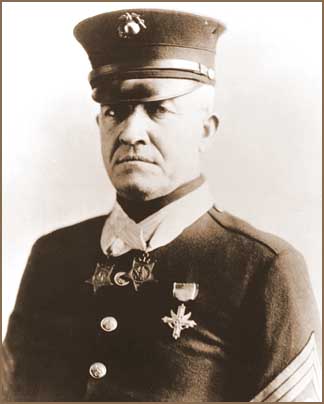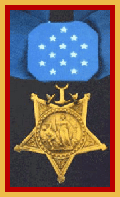
Sergeant Major Daniel Joseph Daly, USMC
Sergeant Major Daniel ("Dan") Daly was once acclaimed by Major General John A. LeJeune, former Commandant of the Marine Corps, as "the outstanding Marine of all time." General Smedley D. Butler called him "The fightinest Marine I ever knew," and wrote that "it was an object lesson to have served with "him." Marine officers and enlisted men generally expressed this kind of praise alike and, according to the record, "Dan" Daly deserved it. Sergeant Daly and General Butler are the only Marines who ever received the Nation's highest military award-the Medal of Honor-twice for separate acts of heroism. Daly was a strict disciplinarian, yet fair-minded and very popular among both officers and enlisted men. He was noted not only for his reckless daring, but also for his constant attention to the needs of his men. Offered a commission on several occasions, he is said to have declined on the grounds that he would rather be "an outstanding sergeant than just another officer."
Dan Daly is perhaps best remembered for a famous battle cry delivered during the desperate fighting in Belleau Wood in June 1918. Marines took a terrific pounding on the outskirts of Lucy le Bocage ("Lucy Birdcage" to the A.E.F.) at the fringe of Belleau Wood. They were outnumbered, outgunned and pinned down. Then Daly made history. He ordered an attack. Leaping forward, he yelled to his tired men, "Come on, you sons of bitches, do you want to live forever?"
|

|
|
|

Medal of Honor
|
The Medal is awarded "in the name of the Congress of the United States," and for this reason, it is often called the Congressional Medal of Honor. It was only on rare occasions, however, that Congress awarded special Medals of Honor. An executive order, signed Sept. 20, 1905, by President Theodore Roosevelt directed that the ceremonies of award "will always be made with formal and impressive ceremonial" and that the recipient "will, when practicable, be ordered to Washington, D.C., and the presentation will be made by the President, as Commander-in-Chief, or by such representative as the President may designate." The Navy Medal of Honor is made of bronze, suspended by an anchor from a bright blue ribbon, and is worn about the neck. The ribbon is spangled with a cluster of 13 white stars representing the original states. Each ray of the five-pointed star contains sprays of laurel and oak and is tipped with a trefoil. Standing in bas-relief, circled by 34 stars representing the 34 states in 1861, is Minerva, who personifies the Union. She holds in her left hand the fasces, an ax bound in staves of wood, which is the ancient Roman symbol of authority. With the sheaf in her right hand, she repulses the serpents held by the crouching figure of Discord. The reverse side of the Medal is left blank, allowing for the engraving of the recipient's name and the date and place of his or her deed. Criteria for award of The Medal of Honor, established by joint resolution of Congress, July 12, 1862, (amended by Act of July 9, 1918, and Act of July 25, 1963) is awarded in the name of Congress to a person, who, while a member of the armed forces, distinguishes himself or herself conspicuously by gallantry and intrepidity at the risk of his life above and beyond the call of duty while engaged in an action against any enemy of the United States; while engaged in military operations involving conflict with an opposing foreign force; or while serving with friendly foreign forces engaged in an armed conflict against an opposing armed force in which the United States is not a belligerent party. The deed must have been one of personal bravery or self-sacrifice, an action that conspicuously distinguished the individual above his comrades. Incontestable proof of the performance of service is exacted and the recommendation for award of this decoration is considered on the standard of extraordinary merit. Eligibility is limited to members of the armed forces of the United States in active military service.
|

Navy and Marine Medal of Honor
|
|